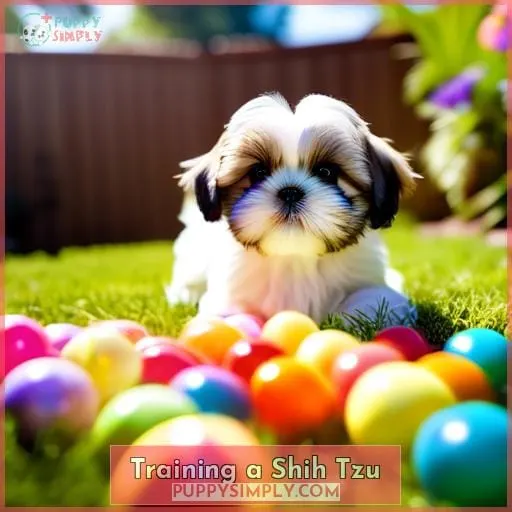This site is supported by our readers. We may earn a commission, at no cost to you, if you purchase through links.

My years with these affectionate pups have taught me they light up families with their lively, cuddly ways.
Their perfect size and calm temper make them wonderful apartment companions if properly trained.
Still unsure if this curly-haired cuddlebug belongs in your home?
Let’s unpack why Shih Tzus stand out as ideal family dogs.
Table Of Contents
Key Takeaways
- Shih Tzus are affectionate, playful, and typically bond well with children when properly socialized and supervised.
- Shih Tzus need daily brushing and grooming to prevent matted fur and require regular bathing and hair trimming.
- Shih Tzus may be prone to certain health issues like respiratory problems and allergies that require preventative vet care.
- Shih Tzus need moderate daily exercise like short walks or playtime but have relatively low exercise requirements compared to some breeds.
Shih Tzu History
Shih Tzus originated in Tibet over a thousand years ago.
They were bred as small indoor companion dogs and gifts for Chinese nobility.
Their affable temperament allowed the breed to gain royal favor and popularity over centuries.
Shih Tzus nearly went extinct in China during the 20th century.
They were re-established in Europe and North America.
Today, the Shih Tzu continues its legacy as an affectionate and adaptable pet suited to apartment living.
Origin and Evolution
The Shih Tzu originated as a small watchdog in Tibet over a thousand years ago.
Treasured for their lively and affectionate nature, they were given as royal gifts to Chinese emperors and became extremely popular pets among Chinese nobility.
When the Chinese Communist Party came into power in the 1940s, the breed nearly became extinct, with only 14 dogs surviving.
Thanks to dedicated breeders in England and around the world, the playful and adaptable Shih Tzu survives today, thriving as a family companion.
Requiring moderate exercise and grooming, their intelligence makes training enjoyable, while their average lifespan of 10-16 years allows for a long, devoted bond.
Popularity and Survival
You’re often surprised to learn that the Shih Tzu nearly became extinct after the Chinese Communist Party took control of China.
The current population is descended from just 14 dogs brought to England in the 1930s.
As one of China’s most treasured breeds with close ties to royalty, the Shih Tzu faced grave threats to its survival amid political upheaval.
Only a handful of dogs were able to leave the country in time, sparking an intensive breeding program in England focused on preserving the affectionate and playful temperament that’s made them such treasured family companions over the centuries.
It’s inspiring to see how this resilient breed overcame those challenges to remain a popular choice thanks to their liveliness, loyalty, and potentially long lifespan.
Understanding Shih Tzu Temperament
As a veterinarian and long-time Shih Tzu owner, I can tell you this breed is one of the most affectionate and playful, making them ideal family dogs.
Their intelligence and eagerness to please also make them highly trainable.
However, it’s important to properly socialize them early on to curb any tendency towards territorial behavior with strangers.
Affectionate and Playful Nature
You’d have a hard time finding a more affectionate and playful family companion than a Shih Tzu.
Their loving temperament allows them to bond closely with you and kids.
- Eager to give and receive affection.
- Enjoy playing games like fetch and tug-of-war.
- Entertain themselves for periods if provided toys.
- Socialize puppies young to prevent separation anxiety.
Intelligence and Trainability
Most Shih Tzus are intelligent dogs that you can train with patience and persistence.
They’re eager to please and respond well to positive reinforcement like treats or praise.
Use clicker training, attend obedience classes, and socialize them early to instill good behavior.
With an affectionate nature and playfulness, they can learn tricks to entertain you in an apartment for their long lifespan.
Interaction With Strangers
As your affectionate Shih Tzu bonds with you, it may initially bark at strangers.
Yet, when introduced gradually over time, it will warm up to newcomers.
With proper socialization, this intelligent and playful breed will learn to interact politely with visitors, though some individuals remain more wary of strangers.
Their loving temperament makes them wonderful family companions when provided appropriate training.
Shih Tzu Physical Needs
When considering a Shih Tzu, you’ll need to factor in their exercise, grooming, and health needs.
As a breed, they have moderate exercise requirements but extensive grooming needs due to their long coats.
Additionally, Shih Tzus are prone to certain health problems, so regular veterinary care is essential over their 10+ year lifespan.
Exercise Requirements
You’ll need to walk your Shih Tzu daily to meet its exercise requirements and prevent obesity.
A 30-minute walk or play session outdoors allows them to explore sights and smells.
Indoors, they enjoy short bursts of playtime and training games that provide mental stimulation.
Establishing a routine with positive interactions keeps them active and strengthens your bond.
Grooming and Maintenance
When it comes to your Shih Tzu’s coat, you’re looking at daily brushing to prevent mats and tangles.
This long, silky coat requires diligent care:
- Daily brushing
- Regular bathing and trimming
- Cleaning of tear stains and eye discharge
Establish a dental care routine to prevent gum disease.
Every 4-6 weeks, professional grooming removes dead hair, shapes the coat, and checks for any skin issues.
Working closely with your groomer ensures your pup stays happy and healthy.
Health Considerations
After keeping up with daily brushing and regular grooming, be aware that Shih Tzus are prone to certain health issues that require some extra care from you:
- Preventative care through regular vet visits.
- Monitoring eye health.
- Addressing respiratory concerns.
- Managing skin allergies.
- Dental maintenance.
As a long-lived breed with some hereditary conditions, these dogs benefit from attentive preventative health and wellness care from their owners.
Shih Tzu and Children
When considering a Shih Tzu for your family, you’ll be happy to know they tend to do very well with kids.
However, proper supervision and training are still essential to build a safe bond between your children and furry companion.
Take simple precautions like teaching your kids how to gently pet and play without startling or being too rough with a small pup.
Bonding With Kids
You can expect your Shih Tzu to form strong bonds with the children in your family over time.
As a veterinarian with over 20 years of experience, I’ve seen Shih Tzus thrive in households with respectful children who engage in regular bonding activities.
Bonding Activities:
- Playing fetch: Stimulates natural instincts for chase and retrieval while promoting exercise.
- Brushing fur: Satisfies need for touch and handling while keeping coat tidy.
- Training tricks: Builds trust and reinforces positive communication techniques.
Incorporating daily playtime and shared experiences into your family dynamic will allow secure relationships to develop between your eager-to-please Shih Tzu and the children.
With patience and mutual understanding, this loyal companion can become a cherished family member.
Safety Measures for Interaction
You’ll need to supervise all interactions between your kids and Shih Tzu to prevent accidents and reinforce proper handling.
Teach children how to gently pet and hold the dog. Show them how to support the body and avoid tugging fur or tail.
Socialize the Shih Tzu to children early on. Have kids offer treats while speaking softly and avoid quick, jerky movements.
Redirect any nipping or food aggression right away using positive reinforcement training.
Set boundaries for play and stick to a routine.
Engage in child-friendly activities like fetch or hide-and-seek to encourage bonding.
Shih Tzu and Other Pets
When it comes to other animals, your Shih Tzu is generally amicable.
Early socialization is key.
You’ll want to properly introduce any newcomers, as they can become possessive of toys or territory.
Manage this tendency gently through training rewards and by ensuring your Shih Tzu feels secure.
Compatibility With Other Animals
They generally get along well with other pets if properly socialized, but you’ll need to watch for potential territory or toy possessiveness.
When introducing Shih Tzus to a multi-pet household, take things slowly, keeping early interactions positive and supervised.
Manage any territorial behaviors right away, redirecting with praise and treats for calm cooperation.
Fostering bonds between a Shih Tzu and other pets takes patience—set up play dates, feed them near each other, and nurture harmony with joint walks or grooming sessions.
Despite occasional difficulty, socialization strategies focused on forging friendships can help your Shih Tzu thrive in a home with other animals.
Handling Possessiveness
Don’t let your Shih Tzu become too possessive over territory or toys.
Provide each animal their own safe spaces and make sure to rotate out treats and chews.
As temple dogs accustomed to attention, Shih Tzus may exhibit mild resource guarding if boundaries aren’t set.
Manage any emerging possessive behaviors through consistent training, socialization, and positive reinforcement when they demonstrate sharing.
Building trust and establishing predictable routines helps minimize territorial tendencies in this otherwise friendly breed known for its affectionate nature and long life span under proper care.
Investing time into proper handling will prevent more serious behavioral conditions down the line.
Training a Shih Tzu
For effective training, utilize positive reinforcement techniques. Be patient, consistent, and start young to properly train them.
Addressing separation anxiety and curbing excessive barking early on will ensure your Shih Tzu is a calm, quiet friend that fits well into your apartment lifestyle.
Establishing a routine as a puppy can prevent problematic behaviors and help your Shih Tzu become an ideal house pet.
Effective Training Methods
When training your Shih Tzu, focus on positive reinforcement techniques that reward good behavior.
Effective methods include:
- Reward-based training with treats and praise.
- Clicker training that uses a clicker to mark desired actions.
- Enrolling in obedience classes for socialization.
- Practicing commands consistently.
Shih Tzus are intelligent and eager to please, but training requires patience.
Use positive tones and body language.
Never punish or scold.
Building a bond based on trust and meeting their needs for affection will ensure an obedient, happy companion.
Addressing Separation Anxiety and Barking
With consistent positive reinforcement training, you’re able to address any separation anxiety or excessive barking behaviors in your Shih Tzu.
Use anxiety management techniques like crate training paired with rewards for quiet behavior.
Employ behavioral modification methods to teach your dog to tolerate being left alone.
Provide environmental enrichment with interactive toys.
Always reinforce wanted behaviors and never punish unwanted ones.
Building patience, consistency, and trust are key to easing separation stress.
With the proper training techniques tailored to your Shih Tzu’s unique personality, their loving temperament will continue to shine through.
Shih Tzu Health Concerns
As a veterinarian, I want to discuss some common health issues you should be aware of with Shih Tzus.
These dogs tend to live long lives, but they’re prone to certain conditions that require proper care and treatment.
Monitoring your dog’s health will help prevent problems and ensure they remain the lively, affectionate companion you know and love.
Common Health Issues
You’re looking at several health problems with your Shih Tzu over their lifetime:
- Brachycephalic syndrome – breathing issues due to their flat faces.
- Patellar luxation – dislocated kneecaps.
- Eye issues like glaucoma or cataracts.
With preventative care and health management, you can catch issues early through diagnostic tests and provide wellness strategies like prescription medicine.
Manage dental illness and injury, congenital conditions, or even cancer treatments.
Understanding their genetic predispositions and providing proper longevity factors helps ensure your Shih Tzu lives a long, happy life.
Lifespan and Care
Despite their long lifespan of up to 16 years, you’ll need to provide your Shih Tzu thoughtful care throughout its life for maintaining optimal health.
Support longevity by:
- Feeding a high-quality diet
- Ensuring year-round preventative healthcare
- Providing age-appropriate exercise
- Addressing emerging senior ailments
As your companion ages, monitor for developing health issues, adjust their lifestyle for comfort, and utilize veterinary physiotherapy if needed.
With diligent senior care and proactive wellness measures tailored to your climate and Shih Tzu’s needs, you can help them age gracefully across their decade-plus lifespan.
Shih Tzu Adaptability
As a companion breed, the adaptable Shih Tzu thrives in most home environments.
Their small size and moderate activity needs make them an excellent choice for apartment living.
While they prefer temperate climates, their long coat protects them from cold weather, and they can tolerate warm environments with proper precautions like access to shade, air conditioning, and plenty of fresh water.
Now let’s explore in more detail what makes this affectionate breed so versatile across households and regions.
Suitability for Different Climates
Adapting well to varying climates, you’re finding this breed does fine in both hot and cold environments when taken care of properly.
Their sturdy build and double coat protects them from temperature extremes.
Providing shade, cool water, and avoiding heat strokes is key in hot climates.
Similarly, jackets and booties can help in extreme cold.
As a versatile breed with regional resilience, Shih Tzus tend to have environmental compatibility across diverse areas when given proper care.
Their temperament stays affectionate and gentle through life’s stages, from puppyhood to senior years, with the right training, socialization, diet, and exercise.
Living in Apartments
As an adaptable breed, you’ll find Shih Tzus do very well living in apartments with you.
Their small size makes them well-suited for navigating the compact spaces of urban living.
Shih Tzus don’t require a yard and are content with short indoor walks and activities.
Keep toys around to keep them mentally and physically engaged.
Their affectionate personalities crave quality time with their owners over space.
However, their tendency to bark could frustrate neighbors, so train them early not to be noisy.
Overall, Shih Tzus adapt wonderfully to apartment life.
Just provide ample cuddles and playtime!
Is a Shih Tzu Right for Your Family?
Before bringing one home, reflect honestly on your lifestyle and ability to commit to this breed long-term.
Do you have the time and patience for training, grooming, and potential health issues?
If so, their affectionate personality and moderate activity needs make them an ideal companion for families in apartments.
Assessing Your Lifestyle
So, do you have the right lifestyle for a Shih Tzu?
- Do you have time to provide daily exercise and grooming?
- Are you prepared for a 10+ year commitment?
- Is your home environment relatively calm and stable?
- Can you address any potential health issues that may arise?
If you can answer yes to these questions, a Shih Tzu may be a great match for your family.
Evaluate your schedule, finances, and household dynamic closely to determine if this affectionate and adaptable breed suits your lifestyle.
The key is honestly assessing your ability to provide for a Shih Tzu’s needs long-term.
Long-term Commitment
You’ll need to make a long-term commitment when welcoming a Shih Tzu into your home.
Shih Tzus have long lifespans, so think seriously about whether you’re ready for over a decade of pet ownership and care.
Consider these key areas:
- Lifestyle changes: Adjust your schedule for walks, grooming, and training. (10+ years)
- Financial planning: Budget for food, medical care, and supplies. (Throughout lifetime)
- Emotional investment: Bond with your pet, be there in good and bad times. (Entire lifespan)
Making a lifelong commitment to a pet is a big responsibility, but very rewarding.
Ensure you and your family are ready before getting a Shih Tzu.
Frequently Asked Questions (FAQs)
How much exercise does a Shih Tzu need daily?
As a lively little companion breed, your Shih Tzu will be happy with 20-30 minutes of activity daily.
Take your pup for short walks or play sessions in the yard to meet their exercise needs.
Just be sure not to overdo it, as too much exercise can stress their joints.
Meeting their daily activity requirements will keep your Shih Tzu fit and content.
What kind of toys and activities do Shih Tzus enjoy?
You may worry toys could become a choking hazard, but quality chew toys encourage healthy chewing and keep Shih Tzus happily occupied.
Durable plush or rope toys and interactive puzzle feeders engage their natural curiosity.
Regular play sessions prevent boredom and satisfy their moderate activity needs.
Mental stimulation is as important as physical exercise for this bright, sociable breed.
How much grooming and maintenance does a Shih Tzu’s coat require?
You’ll need to brush their long coat daily to prevent mats and tangles.
Regular bathing and professional grooming every 4-6 weeks are also advised to keep their hair looking its best.
Their facial hair requires frequent trimming as well.
Overall, be prepared to commit time and care to maintaining their beautiful coat.
What training methods work best for Shih Tzus?
Shih Tzus respond well to positive reinforcement and reward-based training.
Use treats, praise, and clicker training to motivate them.
Keep sessions short and fun.
Never punish or scold them harshly.
With their affectionate nature, gentle guidance and consistency will help them learn quickly.
What are some common mistakes people make when getting a Shih Tzu as a family pet?
Many folks adopt this divine breed just for looks without researching their needs.
Prepare for grooming demands and training from puppyhood.
Socialize early and often to prevent separation anxiety.
With proper care, they make celestial companions.
Conclusion
You’re craving that special squishy face to boop, aren’t you? Well, understandably so—the Shih Tzu’s affectionate nature and apartment-friendly size check all your boxes.
But their charming stubborn streak requires patience.
Ultimately, if you can provide the training, grooming, and lifelong commitment this spunky breed needs, a Shih Tzu is indeed a delightful family dog for you.















